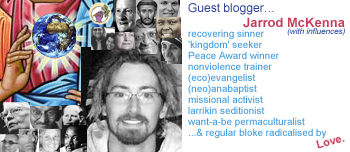
Jarrod McKenna’s Wednesday’s with Gandhi:
![]()
![]()
![]()
![]()
–Mohandas Gandhi, (May 30, 1936) from “Mohandas Gandhi: Essential Writings” by John Dear, p. 79
I’d like to start this post not just with a quote from Gandhi, but a quote from 3 others:
Quote 1.
“Whoever shall now contend that it is unjust to put heretics and blasphemers to death will knowingly and willingly incur their very guilt.”
Quote 2.
“Anyone who can be proved to be a seditious person is an outlaw before God and the emperor; and whoever is the first to put him to death does right and well. For if a man is in open rebellion, everyone is both his judge and the executioner; just as when a fire starts, the first man who can put it out is the best man to do the job.”
Quote 3.
If the words of this last quote were written and acted on in the 16th century the writer could expect a second baptism of the involuntary variety where you never come up for air again. These aren’t the words of some dreadlocked, kingdom-fuelled, commune starting, dumpster diving, fringe-dwelling, freegan, (eco)activist, permaculturalist wanta-be (but thanks for reading my posts anyway ;)) but of Charismatic-Evangelical megachurch pastor, and theologian, Dr. Gregory Boyd.
So what his problem?



